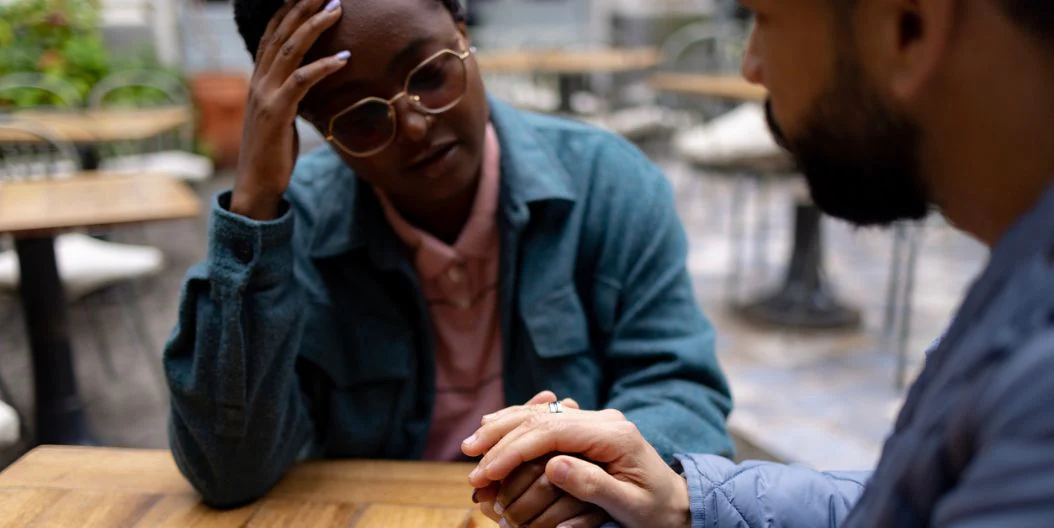The saying goes that “love is blind”, but that can lull a person into ignoring warning signs of an unhealthy relationship because they are overwhelmed with feelings for someone. A person can be involved in a trauma-bonding relationship without knowing it. In fact, they may assume or insist they are simply experiencing love when they actually are being gaslighted by someone who is hurting them.
It can be difficult to determine the difference between a trauma bond vs love, but New View Wellness can help find out if a relationship has crossed the line and become harmful. If you have a partner who is abusive and then follows it up with positive reinforcement, you may be trapped in a cycle of trauma bond. We offer powerful outpatient treatment to help you break those bonds and learn to stand on your own.
What is a Trauma Bond?
A trauma bond develops between two people involved in a relationship in which one person is abusive physically, emotionally, and/or sexually. An emotional bond forms that can be misinterpreted by the victim as love, when instead it is an abusive relationship. In a trauma bond, one person acts in damaging ways toward the other person and then engages in attempts at positive acts to help negate the damage. The victim feels torn between feeling love for their partner and feeling abused. They may blame themselves and feel unable to break away from the relationship. While trauma bonding can take place outside a romantic relationship, such as co-workers or family members, it most commonly develops as a partnership between two people with feelings for each other.
The Difference Between Trauma Bond vs. Love
Key differences lie between trauma bond vs. love, which makes it imperative that a person know which situation applies to them. When people fall in love, they share a foundation based on mutual admiration and respect. They enter into a relationship in which they want the best for each other. Trauma bonds happen in relationships built on one person causing trauma to another without regard to their well-being. Abusive relationships typically crest and fall with a pattern of emotional lows and highs. Loving relationships can have ups and downs, but overall exist on an even keel that focuses on maintaining one’s own happiness while lifting up the other person to their own levels of satisfaction.
It has been said that love is a verb. A person demonstrates their love through loving, caring acts and words. Trauma bonding includes acts and words that are abusive and denigrating. Love allows both people to function independently as well as part of a couple. Trauma bonding requires one person to be in charge and control the other person through dominating and hateful behaviors and words.
How Does Trauma Make a Person Feel?
A key determinate between trauma bond vs love is how each one makes a person feel. When someone is in a trauma-bonded relationship, they will feel:
- Trapped and unable to leave the relationship, often because it feels unsafe or they don’t think they deserve or can find someone better.
- A consistent feeling of anxiety or fear. They worry they will trigger the other person into further abusive behavior.
- Low self-esteem and lack of confidence. The victim may feel stupid, ugly, worthless, or other negative emotions that impact their mental well-being.
- Isolated from family and friends. This may be at the insistence of the abuser or out of fear of loved ones finding out what’s going on.
- An escalation of mental health disorders such as anxiety, depression, or PTSD. Some people also begin to abuse drugs or alcohol to escape their emotions.
How Does Love Make a Person Feel?
Being involved in a healthy, loving relationship means both partners are equal. Love provides exciting, calming, and life-affirming effects on a person’s life, including their emotional well-being. A partnership born of love and not trauma will include causing each person to feel:
- They are supported in their endeavors. Triumphs will be celebrated without jealousy or casting self-doubt.
- They have a safe place to go when they are plagued with doubt or fear, or something troubling has happened to them.
- That compromise must be even-handed so that one partner doesn’t consistently give in to the other’s needs or demands.
- That both partners should live their best lives. Support is given in following their dreams, both big and small.
- The positivity of the relationship overflows into other areas of the person’s life.
Can Trauma Bonding Be Treated?
Trauma can be treated via the use of different types of therapies. Individual therapy helps provide a safe and private place to discuss a person’s emotions, experiences, and fears. Dialectical Behavior Therapy (DBT) teaches the individual to develop skills like mindfulness, interpersonal effectiveness, and emotion regulation.
Family therapy also proves helpful because it helps the loved ones of the person who experienced trauma to understand what they’ve been through. As a result, they can offer effective support and engage in meaningful communication. Because trauma often triggers feelings of anxiety, depression, and other difficult emotions, prescription medication can be used to help alleviate many of these symptoms.
Find Effective Trauma Treatment Today
Are you concerned you may be trapped in a trauma-bonded relationship or recently left one and want to heal the damage done? New View Wellness in Atlanta employs a compassionate staff of therapeutic experts who know how to treat trauma. We help you examine the difference between a trauma bond vs love and learn to avoid entering into another damaging relationship. You have value just as you are and deserve to heal with professional mental health counselors who will show you healthy coping skills.
Have you been a victim of trauma bonding and want to find out how to overcome the effects and move on with your life? Contact us today and speak confidentially with one of our friendly admissions staff members.

